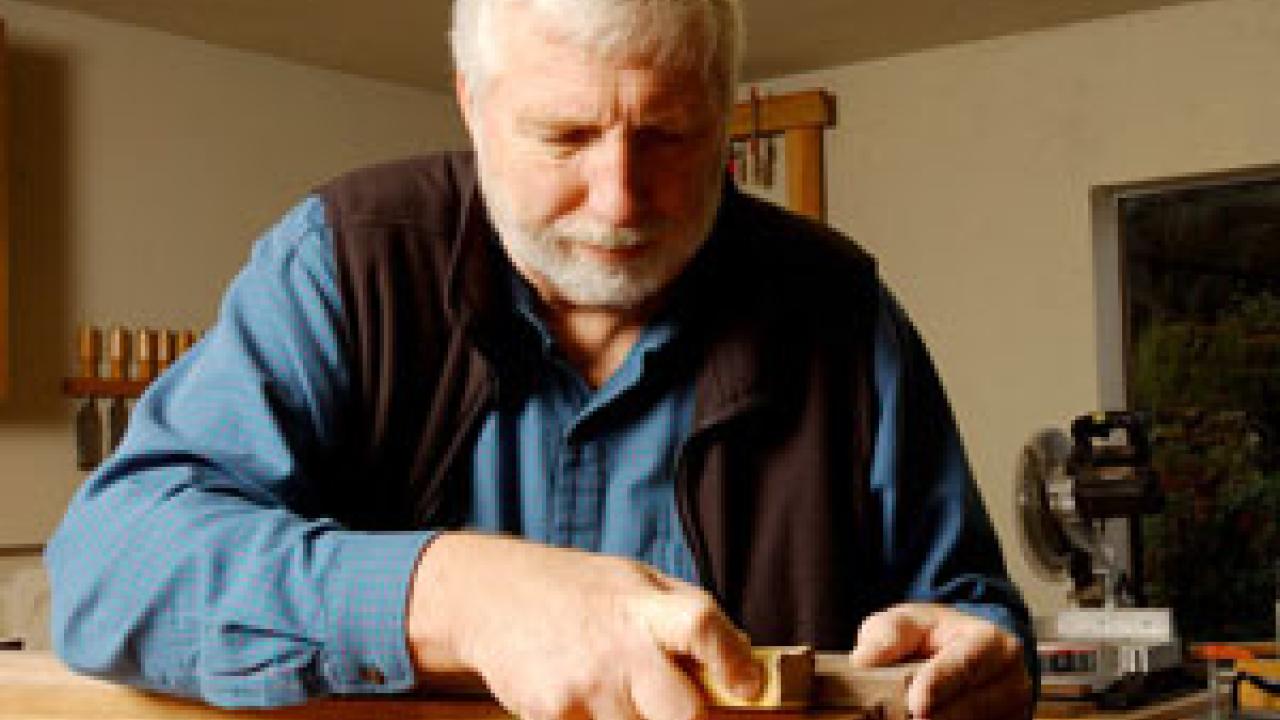If it's wood, this man can shape it into furniture. Neal Van Alfen, dean of the College of Agricultural and Environmen-tal Sciences, is also building the future of the campus's oldest college.
"This is truly one of the more challenging budgetary periods ever faced by this college," said Van Alfen, who's been at the helm since 1999. "We're creating a leaner, more focused college that will continue to produce programs of high quality."
Beyond budgets and botany, Van Alfen is equally at home when he has a saw or hammer in his hand. Carpentry is his passionate escape from the considerable demands of higher education administration.
"I love wood for its beauty," said Van Alfen. "When you're working with your hands you have to focus very intensely, or you'll ruin the wood, or worse, lose your hand."
Van Alfen's interest in woodworking arose years ago while remodeling a house and some cabinets. When he moved from Utah to Texas where the "mountains were scarce and far away," furniture building became his new hobby.
His approach is influenced by Shaker and Craftsmen styles, which echo a return to more simple and functional designs as opposed to the more ornate Victorian aesthetic. Currently he's working on a hutch, among other items, for the dining room.
How does he get an idea? "My wife, Pam, has a list of needed furniture," Van Alfen said. "She keeps me busy with projects."
His plant pathology career and wood-working seem like a natural fit. Van Alfen's research as a professor has focused on controlling plant diseases. He is chair of the National Agricultural Biotechnology Council and a founder of the Agricultural Biotechnology Communicators group.
"While studying chemistry, I became aware of the power of plant diseases while working in the peach harvest," he said. "A plant disease epidemic wiped out most of the harvest during the peak of the season. This hooked me on plant pathology, although I completed my degree in chemistry."
Van Alfen's first position out of graduate school was as a forest pathologist where he became interested in studying chestnut blight. His journey from research to administration has been forged since his upbringing in Modesto. His father, an immigrant from the Netherlands who worked as a certified public accountant in America, died when Neal was young. Suddenly everything changed.
"It created a sense of responsibility in me," said Van Alfen, noting that his mother, a housewife, had to find work while he assumed a larger role in the household. He went on to earn an undergraduate degree in chemistry, a graduate degree in botany from Brigham Young University, and a doctorate in plant pathology from UC Davis.
Why did you choose to enter campus administration?
One, this college is truly a treasure. It's inspiring to lead an organization so productive in its research output. Two, as a faculty member, I realized the value of making contributions to the university beyond my immediate role in the classroom and in the lab. You can only sit back and criticize something you think needs improvement for so long -- then it's time to test your ideas and get involved in the leadership.
What's the biggest issue in plant pathology today?
Crop vulnerability to disease threatens how we can feed the people of the world. It's basically an invasive species problem. There's an abundance of food in this world, but millions of people have died from catastrophic cases of plant diseases, such as during the Irish potato famine and as recently as during the 1940s, to name just two examples. We need to understand how best to protect our plants from disease. Biotechnology is one tool that offers some ways to reduce this threat. I'm convinced that some products developed through biotechnology can provide benefits to our food system and the environment. Of course, the risks and benefits of biotechnology should be evaluated through research.
What do you like most about your job?
It's a challenge that draws upon all one's abilities. We have many issues that arise, from research demands to budget dilemmas, which must be taken care of the right way. We're trying to prepare the college for the future by making the correct decisions now rather than doing too little too late.
The least?
The flip side of the above -- it's an all-consuming job. I admit there's not much time left in the day when I get home to work on wood. That's usually reserved for the weekends and breaks.
What's your philosophy on life?
Openness. It's based on liking people, finding people interesting and discovering how to work with people in positive ways. Also, I've always been an adventurer and enjoy exploring new places and things.
Read a good book lately?
Inventing the Middle Ages, by Norman Cantor, describes how our current notion of the Middle Ages -- with its vivid images of wars, tournaments, plagues, saints and kings, knights and ladies -- was created by historians in the 20th century. I like history, old photos and family heirlooms. I have a photo of my grandfather who was in the Dutch army in the 1800s. I've lived in the Netherlands for a few years and gotten to know my family over there. It's interesting to dig into one's family roots.
What are some of your most treasured possessions?
My five children. There's an extreme sense of inner pride in how well they've turned out. What else could be better than watching and helping your children grow up into fine adults?
What's your guilty pleasure?
I like slapstick humor and movies. Movies with comedians like Steve Martin, Jim Carey, Robin Williams, even the old Dean Martin and Jerry Lewis films. •
